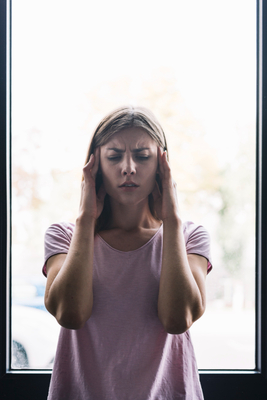- 1-905-452-8193
- Contact Us
- Member Login
- Get Listed Today
- 220,911 members

It's not a guarantee that having occasional anxiety indicates you have an anxiety condition. For example, the anxiety you may experience before an exam, interview, or presentation is usually accepted as normal as it usually goes away after the event. On the other hand, anxiety that interferes with everyday living is persistent and isn't necessarily dependent on certain situations and may be considered a problem.
Once more, even though a clinical mental health illness can only be accurately diagnosed by a registered healthcare provider, you might be able to identify some signs in yourself, which could motivate you to seek out expert assessment and assistance.
Be aware that anxiety disorders come in different forms, such as specific phobias, obsessive-compulsive disorder, and generalized anxiety disorder. These could all show up in various ways. The next ten symptoms, however, are thought to be connected to anxiety disorders generally, and if multiple of them appear at once, it may be necessary to see a mental health professional for assessment.
The National Institute of Mental Health states that individuals suffering from anxiety disorders frequently worry excessively, typically regularly for at least six months. This signature symptom can include intense self-consciousness, trouble trusting people, and a constant need for validation or control.
Avoiding specific anxiety-inducing circumstances can influence their career, school, relationships, and/or day-to-day functioning. Even if the person realizes that what they are feeling is out of proportion to the actual circumstances, it can be difficult to keep these emotions under control without expert assistance.
will to get things done, much less ask for assistance. Getting therapy as soon as feasible would help one heal and fare better. Receiving the ideal care at the right moment, such as the spravato treatment for depression, can contribute to its successful outcome.
Sleep difficulties are "highly prevalent" in people with anxiety disorders, according to one study on the subject. Sleep disorders such as generalized anxiety disorder and post-traumatic stress disorder have included insomnia or nightmares in their clinical diagnoses.
Not only may racing thoughts or the fear of a nightmare disrupt sleep, but they can also make it difficult for someone to fall asleep. As a result, anxiety symptoms could get worse because sleep deprivation can make it harder to control emotions.
As previously indicated, worry is frequently accompanied by sleep disruptions, which can lead to daytime weariness. Nevertheless, anxiety might cause someone to feel exhausted during the day even if they have a good night's sleep.
Having to deal with anxious feelings all the time can be physically and mentally taxing, which can make it harder to get through the day. Once more, lack of sleep can make it more difficult for a person to maintain emotional regulation, which may subsequently have a role in the emergence of other comorbid diseases like depression.
Another common symptom of several anxiety disorders is difficulty concentrating. It may arise as a consequence of ongoing anxiety or difficulty sleeping, or it may manifest itself differently. It could show up as difficulties finishing tasks or assignments, having trouble paying attention during talks, or losing your memory while trying to recall anything. Furthermore, anxiety levels may rise even higher if this condition prevents a person from meeting deadlines or completing necessary chores.
Being "on edge" is another effect of anxiety. Their brain is urging them to focus on a perceived threat, thus if they are lost in worried thought, they may be easily startled or irritated when interrupted. To conquer your depression, have a meeting with spravato providers.
Furthermore, as previously mentioned, living a life consumed by worry can be stressful and draining. Because their anxiety is taking up so much of their energy, a person may find it more difficult to control their emotions.
It's crucial to remember that everyone feels anxious occasionally, and that feeling anxious at times is a common stress reaction. On the other hand, similar symptoms might be a sign of an anxiety disorder if they become severe, persistent, or interfere with everyday functioning.
It's best to get professional assistance if you or someone you know is dealing with chronic anxiety. A mental health expert can accurately diagnose patients, offer assistance, and help them create coping mechanisms that will help them properly manage their anxiety. The management of anxiety-related symptoms can be greatly improved by early intervention and suitable treatment.
